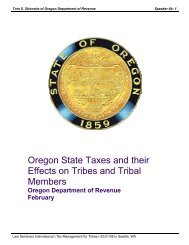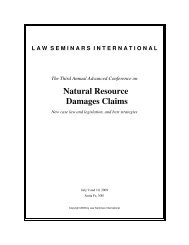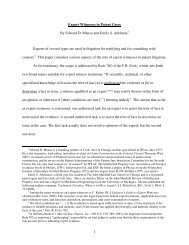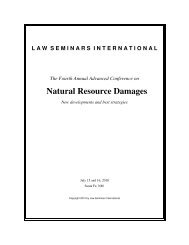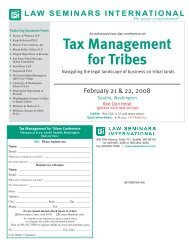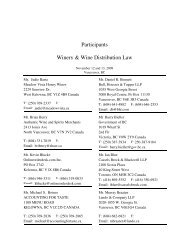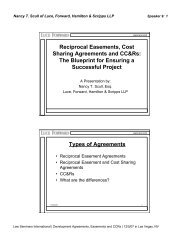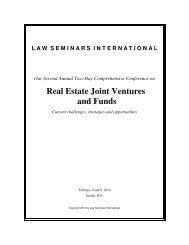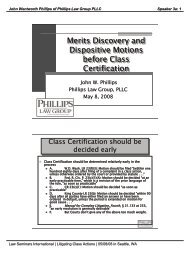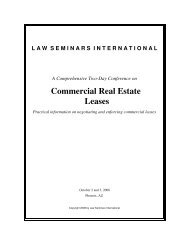Issues Relating to Leases on Native American Reservations
Issues Relating to Leases on Native American Reservations
Issues Relating to Leases on Native American Reservations
You also want an ePaper? Increase the reach of your titles
YUMPU automatically turns print PDFs into web optimized ePapers that Google loves.
Speaker 17: D<strong>on</strong> J. Miner of Fennemore Craig P.C. Page 6<br />
improvements built by the tenant usually revert <str<strong>on</strong>g>to</str<strong>on</strong>g> the landlord." (8th ed. 2004). Ground<br />
leases differ from the typical commercial leases in that they are typically for much l<strong>on</strong>ger<br />
terms, the lessee c<strong>on</strong>structs its own improvements, and the tenant usually needs mortgage<br />
loan financing secured by the improvements.<br />
A distinguishing characteristic of a ground lease is that while the landlord holds<br />
fee title and a reversi<strong>on</strong>ary interest up<strong>on</strong> expirati<strong>on</strong> of the lease in the land, the tenant<br />
owns the equity in the improvements. Further, because the tenant’s ownership of the<br />
improvements and possessory interest in the land are “leasehold estates,” his rights end<br />
up<strong>on</strong> terminati<strong>on</strong> or cancellati<strong>on</strong> of the lease. Thus, when the lease ends, the landlord<br />
will obtain full ownership and possessi<strong>on</strong> of the land and the real property improvements<br />
installed <strong>on</strong> the land by the tenant.<br />
Aside from the natural expirati<strong>on</strong> of the lease term, the tenant’s right <str<strong>on</strong>g>to</str<strong>on</strong>g><br />
possessi<strong>on</strong> may be terminated in a number of circumstances and for a variety of reas<strong>on</strong>s,<br />
including without limitati<strong>on</strong>, failure <str<strong>on</strong>g>to</str<strong>on</strong>g> exercise an opti<strong>on</strong> <str<strong>on</strong>g>to</str<strong>on</strong>g> renew, defaulting <strong>on</strong> the rent<br />
without completi<strong>on</strong> of a cure, defaulting <strong>on</strong> other, n<strong>on</strong>-m<strong>on</strong>etary obligati<strong>on</strong>s without<br />
completi<strong>on</strong> of a cure, damage or destructi<strong>on</strong> without rebuilding, and c<strong>on</strong>demnati<strong>on</strong>.<br />
B. Special <str<strong>on</strong>g>Issues</str<strong>on</strong>g><br />
Aside from the issues that normally arise as a result of the special nature of<br />
ground leases, the added complexities of leasing <strong>Native</strong> <strong>American</strong> lands lead <str<strong>on</strong>g>to</str<strong>on</strong>g> an<br />
additi<strong>on</strong>al layer of issues a tenant or developer will have <str<strong>on</strong>g>to</str<strong>on</strong>g> c<strong>on</strong>sider before entering in<str<strong>on</strong>g>to</str<strong>on</strong>g><br />
a ground lease <strong>on</strong> <strong>Native</strong> <strong>American</strong> lands.<br />
1. Identifying the Landlord and Negotiating the Lease.<br />
Negotiating the leases for <strong>Native</strong> <strong>American</strong> land may take substantially more time<br />
than a typical ground lease because of the number of landowners involved and because<br />
of the additi<strong>on</strong>al layers of governmental agency review and approval.<br />
a. Problem of Fracti<strong>on</strong>ati<strong>on</strong>: Since the Dawes Act,<br />
ownership of allottees land has become increasingly fracti<strong>on</strong>ated. Lands allotted <str<strong>on</strong>g>to</str<strong>on</strong>g><br />
individual <strong>Native</strong> <strong>American</strong> have passed from generati<strong>on</strong> <str<strong>on</strong>g>to</str<strong>on</strong>g> generati<strong>on</strong>. Because of<br />
Law Seminars Internati<strong>on</strong>al | Commercial Real Estate <str<strong>on</strong>g>Leases</str<strong>on</strong>g> | 4/24/07<br />
6




